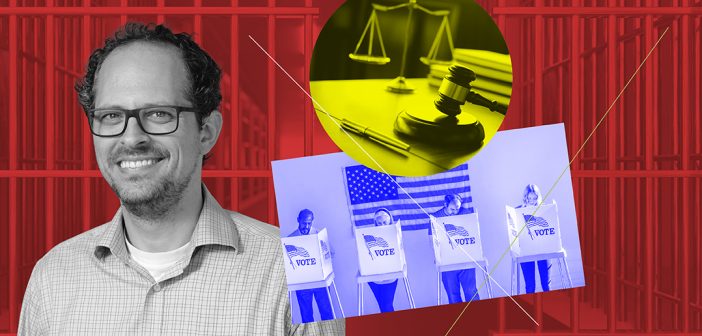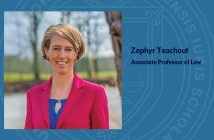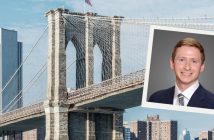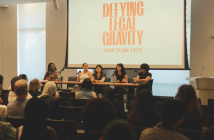Professor John Pfaff, the Joel Reidenberg Distinguished Research Scholar at Fordham Law, is a leading expert on criminal legal reform who has written widely about mass incarceration, criminal sentencing, and prosecutorial discretion.
Pfaff is the author of Locked In: The True Causes of Mass Incarceration and How to Achieve Real Reform, which explores how changes in prosecutorial behavior beginning in the mid 1990s led to massive increases in incarceration rates. He teaches courses on criminal law, sentencing law, and statistics for lawyers.
In the Q&A below, Pfaff discusses his most recent scholarly research—a first of its kind empirical look at the voting demographics of elections of local prosecutors. His work shows that the communities most affected by mass incarceration support policies put forth by prosecutors who promise to address issues such as police violence and racial disparities in sentencing.
What legal subject are you currently working on?
Prosecutors have vast, almost completely unreviewable discretion to determine not just how cases get prosecuted but whether they get prosecuted at all. Over the past 10 years, a cohort of reform prosecutors have sought to use that power to do things like roll back mass incarceration, reduce racial disparities in punishment, or confront police violence more directly.
Yet, despite the growing power of such prosecutors (by now, around15% to 20% of Americans live in a county with some sort of reform prosecutor), as well as the increasing backlash that they face, we don’t really understand the politics of their elections. So, I’ve spent the past few years gathering precinct-level voting data on prosecutor races since the 2010s; I now have data from about 30 elections across dozens of cities. Combining this voting data with really local demographic data from the Census has allowed me to develop a good sense of who supports and resists reformers.
How does the subject matter you are working on impact people and/or the legal community?
Opponents of criminal legal reform have often argued that reforms are driven by progressive white voters—people who may care about the criminal legal system, but who do not suffer the alleged costs of voting for what their critics call “pro-crime” prosecutors. In other words, these critics are arguing that reforms are actually opposed by those in whose name progressives claim to speak (namely high-crime communities, especially high-crime communities of color). My data, however, shows that these critics get the facts exactly backwards: the precincts that support reform prosecutors the most are Black communities in the hearts of cities, including those with the highest levels of violence.
In other words, the voting data tells us that those who bear the brunt of criminal legal enforcement are making it clear—loudly and across multiple cities—that they feel punitive, “tough-on-crime” policies are failing them, and that they want leaders who will depart from this harsh status quo.
Why is this scholarship important?
Mass incarceration, and mass punishment more broadly, are among the most pressing civil rights issues of our time. And mass incarceration, while national in scope, is driven almost entirely by local actors, especially local police and prosecutors. And there is very little that state or federal officials can do to change or regulate how these officials behave. Change, if it is going to happen, is going to be driven by local politics, so it is impossible to either understand or shape that change without understanding the dynamics of these local campaigns.
What have you learned about this topic or issue that people may not realize?
One thing that has surprised me as I’ve worked on this is that there is very little empirical research on local politics and elections. There are stacks of political science studies on congressional and presidential elections, but almost none on, say, mayors and district attorneys. This is a common bias in academia as a whole, but I think especially in law schools: we tend to focus almost entirely on what happens at the federal level, even though local officials likely exert much more influence on people’s day-to-day lives. It’s true that a single act by a president or Congress has a reach that no mayoral decision can; but in the aggregate, what mayors and DAs and police chiefs do likely matters far more. Yet as far as I can tell, mine is one of the only empirical projects to look this closely and extensively at how we choose some of the, if not the, most powerful law enforcement officials in the United States.
How does your scholarship in this area relate to your teaching?
I think in law school we are very good about talking with our students about the “demand” side of policy: “here is what good policy looks like,” and “this is why we should do this.” In other words, we often discuss what we should demand from the legal system. We are less careful about teaching the “supply” side: can the legal system—the courts, the legislators, the enforcement agents on the ground, and so on—actually provide that policy? Is it politically possible? If the legislature passes the law, will the executive just ignore it? If someone promises to adopt certain legal policies, can they actually get elected? And so on.
My work right now is very much about the supply side. Almost all prosecutors in the United States are elected, and the politics of those elections shape what those reformers can do. So while the formal law may grant all prosecutors, everywhere, wide discretion in how they enforce the law, prosecutors’ freedom to take advantage of that discretion may vary systematically across counties, based on those counties’ electoral politics. Those political constraints shape how the law is practiced just as much as, if not more than, the formal law in the books, and it is critical for students to understand what these “supply-side” constraints look like and how they operate.




